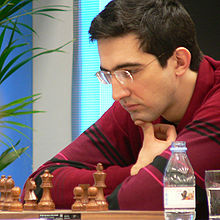Vladimir Kramnik (25 June 1975)

Vladimir Kramnik was born on 25th June 1975 in Tuapse, Russia. His father was an artist and his mother taught music. Though none of his family members played chess, Kramnik learned to play from his father, at the age of four. Kramnik was immediately absorbed into the game and began his tuition at the local Pioneers at the age of five. He became the champion of Tuapse when he was seven years old. At eleven, he became a
candidate master. At around this time, he also came to the attention of the famous Soviet Chess School and in particular its headmaster, former World Champion Mikhail Botvinnik. Kramnik made great progress.
Kramnik's style of play was most influenced by Capablanca, Alekhine, Fischer, Karpov and Kasparov. Kasparov lectured at the school on one occasion, and Kramnik was surprised by the fact that, despite Karpov and Kasparov having completely different styles, they were both champions. He had come to the conclusion that it was necessary to be very versatile in order to become a well-rounded player.
Kramnik was successful in junior tournaments in his early years, winning the World Under 18 Championship in 1991. However, his first big opportunity in his career came in 1992, when Kasparov convinced the Russian chess establishment to allow him to represent Russia in the 1992 Manila Olympiad. Kramnik was only 16 at the time, and he was not yet a grandmaster whereas Russia had several grandmasters. Kramnik justified Kasparov's trust by scoring a fantastic eight wins and one draw out of nine games. The Russian team cruised to victory once again, with Kramnik winning an individual gold medal for best score, which, coincidentally was awarded to him on his 17th birthday.
Between 1992 and 2000, Kramnik made rapid progress into the world's elite by winning outright or tying for first/second at numerous international tournaments. Many critics, Kasparov included, thought of Kramnik as the most likely heir to the throne. However, Kramnik's victory over
Kasparov in 2000 was quite stunning as Vladimir had previously shown little aptitude for match play. The difference in London could be attributed to his meticulous opening preparation and development of the right attitude.
After negotiations with FIDE, he agreed to a unification match between PCA and FIDE, and, in 2006, FIDE's challenger, the Bulgarian grandmaster Veselin Topalov qualified for this match after having won the 2005
FIDE World Championship Tournament. Kramnik prevailed in this match with five wins, seven draws, and four losses, with one of the losses having been a forfeit during a dispute over unsubstantiated allegations that Kramnik had been cheating.
In 2008, Indian Viswanathan Anand dethroned Kramnik in a
12-game match in Bonn, Germany. The match started on October 14, 2008 and ended on October 29, 2008. Anand did not need the full 12 games to claim victory as he obtained 3 wins, 7 draws and just 1 loss.
Kramnik's autobiography
My Life and Games, was published in 2000.